Media reports before 2020
2019
- 20 Minuten, ETH-Insektensammlung trifft Textildesign
- Zentralplus, external page Was künftige Textildesigner von einer Insektensammlung lernen
- Textilrevue, external page Insektensammlung trifft Textildesign
- FH News, external page «RENDEZ-VOUS! – INSEKTENSAMMLUNG TRIFFT TEXTILDESIGN»
2018
- Scientific American, “Is Malaria's Peculiar Odor Key to Its Conquest?”, R. Conniff
- Science Update at the American Association for the Advancement of Science (AAAS) radio interview, Bob Hirshon
- ETH Zürich, “Duftstoff-Cocktail verrät Malaria, P. Rüegg
- ALN, “Altered Body Odor Indicates Malaria Even if Microscope Doesn't”, A.E. Messer
- The Medical News, “Volatile biomarkers could help detect acute and asymptomatic malaria infections”
- Ärzte Zeitung, “Forscher können Malaria jetzt riechen”
- Daily News and Analysis, “Sudden alteration of body odours indicates malaria”
- Genetic Engineering and Biotechnology News, “Smelly Biomarkers Accurately Predict Malaria Infections”
- Kurier.at, “Duftstoffprofile verraten akute und stille Malaria-Infektionen”
- ANI news, “Sniffing out malaria”; Bionity.com, “Malaria detectable in olfactory cocktail”
- Business standard, “Body odour may help identify malaria: study”
- Futurity, “ ‘Odors’ from skin indicate malaria, even without symptoms”
- Scicasts, “Malaria Detectable in Olfactory Cocktail, Says Study”
- Medindia, “Detecting malarial infection with body odor”.
- ETH Explora, Digitize, share, connect. Data from natural history collections go mobile.
2017
- Plants can see, hear and smell - and respond, Josh Gabbatiss, BBC Earth
- The Thorny Truth About Spine Evolution, Christie Wilcox, Quanta Magazine
- Plant Spines Are a Defensive Win Against Threats Big And Small, Mike Mcrae, Science Alert
- Obstacle course for Caterpillars, Maja Schaffner, ETH life magazine
- external page Das unheimliche Sterben unserer Insekten, Blick am Sonntag
- external page Digitization of the ETH Entomological Collection, iDigBio Newsletter
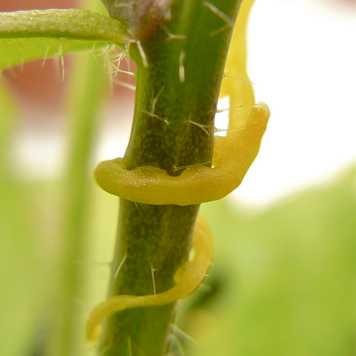
external page Plants can see, hear and smell - and respond, Josh Gabbatiss, BBC Earth, January 2017
2016

Download Was machen die da drin? (PDF, 6.5 MB) [in German], Mathias Plüss, Das Magazin, 8. Oktober 2016
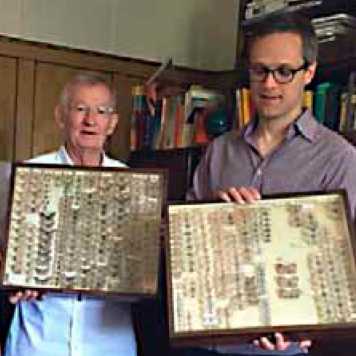
Download Ein kleiner Schatz verlässt Reichenburg in Richtung ETH (PDF, 136 KB) [in German], Ivan Theiler, Höfner Volksblatt, 19. August 2016
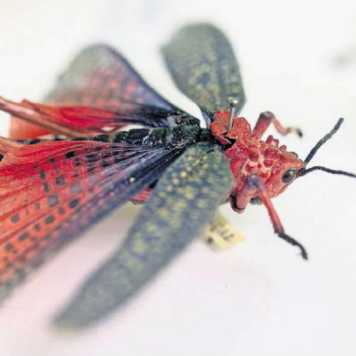
external page Geheimnisvolle Welt der Insekten [in German], Video by Doris Fanconi, published in Tagesanzeiger online 19 July 2016
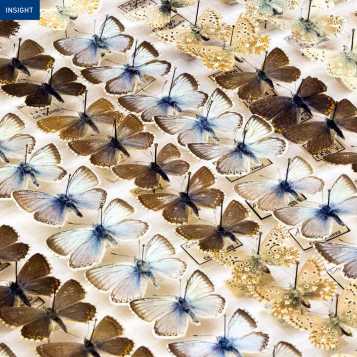
Download Treasure Trove (PDF, 282 KB), Article by Inken De Wit, published in "ETH life magazine" volume 2, 2016
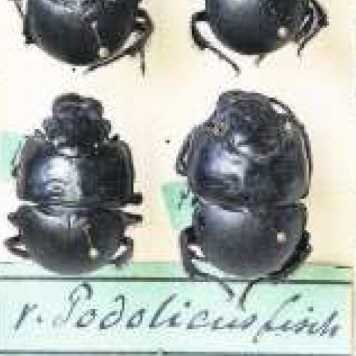
Download Stadt der Toten (PDF, 203 KB) [in German], Patrick Imhasly, NZZ
2014
- Malarial mice smell better to mosquitos, K. Hopkin, Scientific American
- Malaria parasite 'can manipulate body odour of mice. S. Mudasad. BBC News
- Malaria Makes You Smell Delicious To Mosquitoes, Thus Helping The Disease Complete Its Life Cycle”, Anthony Rivers. Medical Daily
- Mosquitoes Attracted to Malaria-Infected Mice. Trace Vence. The Scientist
- Malaria parasite alters host body odor to entice mosquitoes. Geoffrey Mohan. LA time Science Now
- Malaria may change the way you smell making you irresistible to mosquitoes”, Sarah Griffiths. The daily Mail
- Your Scent May Change When You're Infected with Malaria: Natural Mosquito Attractant, Catherine Griffin. Science World Report
2013
- Plants smell danger. Bob Hirshon. AAAS Science Update (Jan 4 podcast).
- On the Scent? Johnna Rizzo, National Geographic Magazine
- Put Off the Scent. Ashley Braun, Natural History Magazine
- Plant sniffs out danger to prepare defenses against pesky insect. Science Daily
- Plants smell danger from flies on the prowl. Futurity.org
2012
- Do Plants Smell Other Plants? This One Does, Then Strangles What it Smells. Robert Krulwich. NPR. May 24, 2012.
- Common Scents:Plants Constantly Catch a Whiff of their Neighbors’ Perfume. Daniel Chamovitz. Scientific American. May, 2012.
2010
- A quick sniff and she’s off. Caroline Ash. Science: Editors’ Choice. Feb. 29, 2010.
- Aphid deception. Nature: Research Highlights. Feb. 10, 2010.
- Plant virus tricks teach evolutionary pest management. Brandon Keim Wired Science. Feb.2, 2010.
- The grass isn’t always greener. Dr. Jim Caryl. Mental Indigestion. April 7, 2010.
- Virus makes plants lie to insects. Susan Milius. ScienceNews. Jan. 16, 2010.
2009
- Sorry Vegans: Brussels Sprouts like to live, too. Natalie Angier. New York Times. Dec. 22, 2009.
- No brainer behavior. Susan Milius Science News. June 20, 2009.
- Bacteria protect soybean from Aphids. Science Daily. April, 2009.
2008
- Loyal to its roots. Carol Kaesuk Yoon. New York Times. June 3, 2008.
2006
- This plant has the sense of smell (loves tomatoes, hates wheat). Henry Fountain. New York Times. Oct. 3, 2006.
- Interview, As it Happens, CBC Radio. Oct. 3, 2006.
- Science Notebook. David Brown, Washington Post. Oct. 2, 2006.
- Prey’s perfume. Sarah Everts, Chemical and Engineering News. Oct.2, 2006.
- Scent stalking: parasitic vine grows toward tomato odor. Science News. Sept. 30, 2006.
- Interview, Science in Action, BBC World Service Radio. Sept. 29, 2006.
- Parasitic weed uses chemical cues to find host plant. Science. Sept. 29, 2006.
- Parasitic weed sniffs out prey, study says. Sean Markey, National Geographic News. Sept. 29, 2006.
- Parasitic weed seems to smell its prey. ABC News.com. Sept. 29, 2006.
- Interview, Leading Edge, BBC Radio 4. Sept 28, 2006.
- Interview, All Things Considered, NPR Radio. Sept 28, 2006.
- Weed with a nose. Alan Boyle, NBC.com (video). Sept. 28, 2006.
- Parasitic weed ‘sniffs out’ its prey. MSNBC.com. Sept. 28, 2006.
- Smells like trouble: parasitic weed sniffs out its prey. International Herald Tribune. Sept. 28, 2006.
- The parasite and the perfume. David Tenenbaum, The Why Files. Sept. 28, 2006.
- Parasitic plants sniff out hosts. A'ndrea Elyse Messer, EurekAlert. Sept. 28, 2006.
- Cunning weed sniffs out victims. Jeanna Bryner, Live Science. Sept. 28, 2006.
- Devious dodder vine sniffs out its victims. NPR.com. Sept. 28, 2006.
- Parasitic vine sniffs out victims. Discovery Channel. Sept. 28, 2006.
- Parasitic weed sniffs out its prey. CNN.com. Sept. 28, 2006.
2004
- Picky Eater. Amanda Yarnell, Chemical and Engineering News. June, 2004.
- Unusual diet helps caterpillars. Washington Post. June, 2004.
- Choice of food helps hungry caterpillars. Innovations report. June, 2004.
2003
- Plants repel insect pests. True Health. 2003.
- Talking Trees. C. Berger, Odyssey – Adventures in science. March, 2003.
2002
- Talking plants. S. Russell, Discover Magazine, 47-51. April, 2002.
2001
- Stay Away from Tobacco. Heather Van Daren, Natural History. October, 2001.
- Making crops cry for help. John Whitfield, Nature. Vol 410:736-737.
- Las plantas no pueden huir, pero se defienden. El Pais. April 18, 2001.
- Fending off nighttime attacks. Washington Post. April 15, 2001.
- La plante qui appelle au secours. La Science d’ici et d’ailleurs (France). April 3, 2001.
- Plant signal friends, foes with scents that change as day turns to night. Chemical and Engineering News. April, 2001.
- Les subtiles leçons de lutte biologique des végétaux contre les prédateurs. Le Monde. France. April 6, 2001.
- CNN Headline News. April, 2001.
- La plante qui appelle au secours. La Science. France. April 3, 2001.
- Plants put up the 'occupied' sign. Kenneth Lee, The Scientist. March 30, 2001.
- Nocturnal emissions repel moths. Nature (science update). April, 2001.
- Leaf me Alone. John Whitfield, Nature (science update). April, 2001.
1999
- Plants thwart pests by sending out chemical distress signals. Elliott Minor, Associated Press. Jan.28,1999.
1998
- Um perfume para cada inimigo. Super Interessante, Brazil 123:14-15. March, 1998.
- BBC and NPR report on “Herbivore infested plants selectively attract parasitoids”.
- It’s chemistry: pestered plants cry for help to bring "good bugs" to their aid. AJC, A8. June 13, 1998.
- Les plantes s'auto-defendant. Julie Lasterade, Liberation. France. June 23, 1998.
- Le radar chimique des quepes. Yves Miserey, Libertade. France. June 23, 1998.
- Plants send SOS when caterpillars bite. Jan Suszkiw, Agricultural Research. October, 1998.
- Plants and Wasps nip bad bugs in the bud. Laura Wexler, Georgia Magazine. vol 77(4):11. 1998.
- Quand les plantes passent a la contre-ataque. Sophie Coisne, Science e Vie Junior, vol 109. France. Oct., 1998.
1997
- Fine-tuned plant response to insect attack. C. Milot, Science News, 152: 391. Dec. 1997.